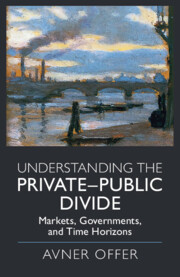Book contents
- Understanding the Private–Public Divide
- Understanding the Private–Public Divide
- Copyright page
- Dedication
- Contents
- Figures
- Tables
- Preface
- Abbreviations
- Introduction
- Chapter 1 Patient Capital
- Chapter 2 Corruption and Integrity
- Chapter 3 Plutocratic Blowback
- Chapter 4 Creating Humans
- Chapter 5 Exit from Work
- Chapter 6 Housing and Democracy
- Chapter 7 Climate Change and Time Horizons
- Conclusion
- References
- Index
Chapter 7 - Climate Change and Time Horizons
Published online by Cambridge University Press: 14 April 2022
- Understanding the Private–Public Divide
- Understanding the Private–Public Divide
- Copyright page
- Dedication
- Contents
- Figures
- Tables
- Preface
- Abbreviations
- Introduction
- Chapter 1 Patient Capital
- Chapter 2 Corruption and Integrity
- Chapter 3 Plutocratic Blowback
- Chapter 4 Creating Humans
- Chapter 5 Exit from Work
- Chapter 6 Housing and Democracy
- Chapter 7 Climate Change and Time Horizons
- Conclusion
- References
- Index
Summary
Climate change is a time horizon problem. Economics proposes a carbon tax and leaving the rest to the market. Tax levels are calculated by combining an economic growth model with climate projections. Such models predict very little economic impact, at odds with the alarmist projections of climate science. Economic methodology and selective evidence combine to induce complacency. This was endorsed by a Nobel Prize for William Nordhaus, its leading exponent. Complacency was challenged within economics for not being predicted by extrapolation, disregarding future generations, and modelling the risks incorrectly. Economics bears some responsibility for the problem it tries to solve. It ignores non-rational forms of denial, and falls victim to them itself. With no guidance from economics on how to address climate change, the actual approach chosen is central government precommitment, in line with our own time-horizon model.
Keywords
- Type
- Chapter
- Information
- Understanding the Private–Public DivideMarkets, Governments, and Time Horizons, pp. 147 - 170Publisher: Cambridge University PressPrint publication year: 2022

